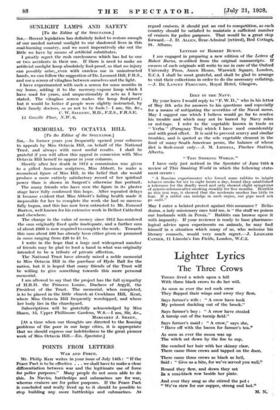POINTS FROM LETTERS
WAR AND FORCE.
Mr. Philip Kerr writes in your issue of July 14th : " If the Peace Pact is to be effective . . . we shall have to make a clear differentiation between war and the legitimate use of force for police purposes." Many people do not seem able to do this. In Navies, battleships and submarines are for war, whereas cruisers are for police purposes. If the Peace Pact is concluded and really lived up to it should be possible to stop building any more battleships and submarines. As regard cruisers, it should put an end to competition, as each country should be satisfied to maintain a sufficient number
of cruisers for police purposes. That would be a great step forward.—J. D. ALLEN, Rear-Admiral (retired), Red Cottage, St. Albans.
LETTERS OF ROBERT BURNS.
I am engaged in preparing a new edition of the Letters of Robert Burns, re-edited from the original manuscripts. If owners of such originals will write to me in care of the Oxford University Press, Amen House, Warwick Square, London, E.C.4, I shall be most grateful, and shall be glad to arrange
to visit their collections in order to do the necessary collating. —J. DE LANCEY FERGUSON, Royal Hotel, Glasgow.
DIET IN THE NAVY.
By your leave I would reply to " F. W. D.," who in his letter of May 5th asks for answers to his questions and especially for a means of mitigating the severities of the Naval menu. May I suggest one which I believe would go far to resolve
his trouble and which may not be barred by Navy rules or red-tape. I refer to the vegetable known in trade as " Yerba " (Paraguay Tea) which I have used considerably and with good effect. It is said to prevent scurvy and similar troubles, and is quoted as the sole vegetable element in the food of many South American peons, the balance of whose diet is flesh-meat only.—J. M. LIDDELL, Pincher Station, Alberta.
" THIS SMOKING WORLD."
I have only just noticed in the Spectator of June 16th a review of This Smoking World in which the following state. meat occurs :
" A Russian experimenter who forced some rabbits to inhale tobacco smoke for six to eight hours a day, found they established a tolerance for the deadly weed and only showed slight symptoms of arterio-sclerosis after smoking steadily for five months. Horrible as this test was, it showed that the moderate smoker has little to fear. If a rabbit can indulge in such orgies, our pipe need not go unlit."
May I enter a belated protest against this assurance ? Bella• donna, a lady missionary once told me, is " the stuff we poison our husbands with in Persia." Rabbits can browse upon it with impunity. If your reviewer is ready to base pharmaco- logical advice upon experiments on animals, he may find himself in a situation which many of us, who welcome his literary counsels, would very much regret.—J. LEONARD CATHER, 11 Lincoln's Inn Fields, London, W.C.2.




















































 Previous page
Previous page